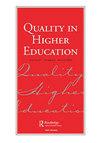确保离岸项目的质量:阿曼主要利益相关者的观点和期望
IF 1.1
Q3 EDUCATION & EDUCATIONAL RESEARCH
引用次数: 2
摘要
通过与国际大学合作伙伴的隶属协议,发展私立高等教育机构提供的离岸课程是确保阿曼苏丹国课程质量的关键战略。然而,从高等教育部官员、管理人员、学者和私立高等教育机构学生的角度对这些方案进行的研究有限。本研究使用差距分析来探讨这些关键利益相关者对阿曼离岸项目质量的期望和看法。报告显示,依赖国际大学合作伙伴来监督它们的海外项目会影响质量,因为当地学者对项目开发的参与有限,学生对课程作业的反馈也有限。学生英语水平不高也使他们难以满足海外项目的要求。主要利益相关者主张,在不损害其学术资格证书的情况下,将阿曼文化价值观融入海外课程,并增强学生的学习经验,使其成为全球公民。本文章由计算机程序翻译,如有差异,请以英文原文为准。
Ensuring quality of offshore programmes: views and expectations of key stakeholders in Oman
Abstract Developing offshore programmes provided by private higher education institutions through affiliation agreements with international university partners is a key strategy to assure the quality of programmes in the Sultanate of Oman. However, there is limited research on these programmes from the perspectives of Ministry of Higher Education officials, managers, academics and students of private higher education institutions. This study uses gap analysis to explore these key stakeholders’ expectations and perceptions of the quality of offshore programmes in Oman. It reveals that dependence on International University Partners to monitor their offshore programmes compromises quality because local academics have limited involvement in developing programmes and students get limited feedback on their coursework. Students’ lack of English proficiency also makes them struggle with offshore programme requirements. Key stakeholders argue for embedding Omani cultural values in the offshore programmes without compromising their academic qualification credentials and enhancing students’ learning experience to become global citizens.
求助全文
通过发布文献求助,成功后即可免费获取论文全文。
去求助
来源期刊

Quality in Higher Education
EDUCATION & EDUCATIONAL RESEARCH-
CiteScore
3.30
自引率
14.30%
发文量
32
期刊介绍:
Quality in Higher Education is aimed at those interested in the theory, practice and policies relating to the control, management and improvement of quality in higher education. The journal is receptive to critical, phenomenological as well as positivistic studies. The journal would like to publish more studies that use hermeneutic, semiotic, ethnographic or dialectical research as well as the more traditional studies based on quantitative surveys and in-depth interviews and focus groups. Papers that have empirical research content are particularly welcome. The editor especially wishes to encourage papers on: reported research results, especially where these assess the impact of quality assurance systems, procedures and methodologies; theoretical analyses of quality and quality initiatives in higher education; comparative evaluation and international aspects of practice and policy with a view to identifying transportable methods, systems and good practice; quality assurance and standards monitoring of transnational higher education; the nature and impact and student feedback; improvements in learning and teaching that impact on quality and standards; links between quality assurance and employability; evaluations of the impact of quality procedures at national level, backed up by research evidence.
 求助内容:
求助内容: 应助结果提醒方式:
应助结果提醒方式:


